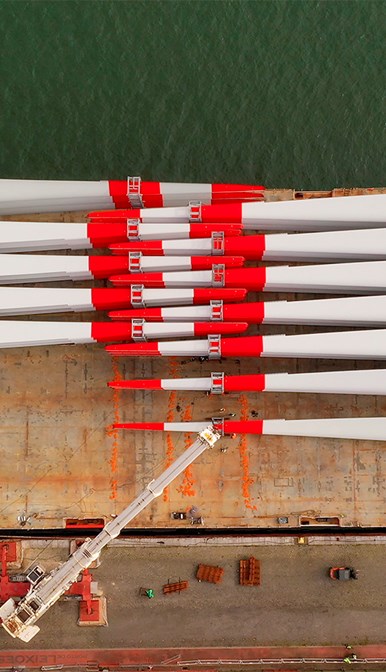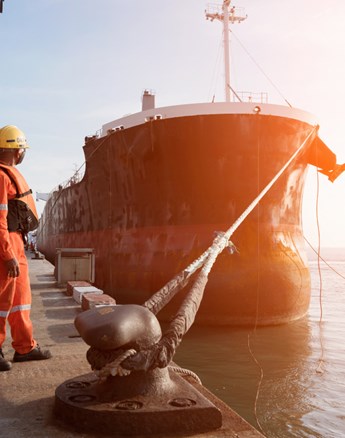Decarbonization and Energy Transition
The current climate crisis has sensitized companies to a more sustainable business model. The European Union aims to make Europe climate-neutral by 2050, implementing the European Green Deal, which aims to reduce greenhouse gas emissions by up to 55% by 2030.
APDL, as a socially and environmentally responsible company, commits to achieving carbon neutrality by 2035, adopting appropriate measures:
Onshore Power Supply (OPS)
Renewable Energy Sources
Alternative Fuels
Electrification of Port Activities
Digitalization
Air Quality
Electric Grid
-
The APDL encourages the use of alternative fuels with minimal or no environmental impact, such as biofuels and hydrogen, a crucial action for reducing emissions from port activities.
GREEN FUELS: A pilot project for biofuels will be launched, and other solutions will be considered, such as the supply of green fuels.
INCENTIVES: Reduction of port fees for ships with better environmental performance.
FUEL STORAGE: Such as hydrogen, ammonia, and methanol, which will drive their usage through the establishment of refueling facilities.
SENSORS: Monitoring of charging stations and the consumption of buildings, equipment, and vehicles more efficiently (Sensing, IoT, AI, Virtual Reality, Digital Twin).
-
APDL's commitment to climate change revolves around promoting renewable energy sources with the aim of generating energy for self-consumption and/or sale.
SOLAR ENERGY: Plans include the installation of photovoltaic panels on building roofs and parking lots.
WIND ENERGY: Plans include the installation of two turbines on the northern breakwater of the Port of Leixões, capable of producing over 20 GWh/year.
WAVE ENERGY: Installation of a pilot unit of floaters on the northern breakwater, with 1 MW capacity, expandable up to 5 MW, to generate approximately 18.5 GWh/year.
-
The electrification of port activities, as well as maritime and land fleets, is a priority aimed at eliminating the use of fossil fuels, allowing for a reduction of 7000 tons of CO2 per year.
ECOTRUCK: Used daily in the port operations of Leixões, contributing to the reduction of the environmental footprint.
NEXT-GENERATION TUGBOATS: Acquisition of 2 next-generation tugboats, emitting approximately 80% fewer pollutants.
ELECTRIC VEHICLES: Acquisition of electric vehicles for APDL's land fleet and implementation of charging infrastructure.
GOODS TRANSPORT: Prohibition of entry and circulation of heavy vehicles EURO I, II, III, and IV at the Port of Leixões.
-
The improvement of air quality and noise reduction will benefit over 2.4 million people in the community. Strengthening the Port/Community relations is our primary objective.
ONSHORE POWER SUPPLY: It will allow ships docking at the Port of Leixões to connect to the electrical grid, eliminating over 38,000 tons of CO2 annually and significantly reducing the noise caused by auxiliary engines.
AIR QUALITY MONITORING: Enhancement of the existing sensor network with specific software to monitor pollutant emissions in the vicinity of the port area.
35% REDUCTION IN EMISSIONS BY 2025;
75% REDUCTION IN EMISSIONS BY 2030;
ZERO EMISSIONS BY 2035 ACHIEVING CARBON NEUTRALITY.
-
ENERGY TRANSITION: The transition to clean energy will only be possible with a significant digital component to monitor the implementation of the strategy towards carbon neutrality.
DATA CENTER: Ensuring the security, availability, and autonomy of port information and management, aiming to establish partnerships with international organizations.
5G PROJECT: This technology enables increased security and efficiency in port operations, as well as measuring their environmental impacts.
JUP - PORT SINGLE WINDOW: A system enabling increased transparency in processes, optimization, and synchronization of multimodal flows, making the port more competitive.
AI - ARTIFICIAL INTELLIGENCE: Development of machine learning to achieve better real-time results.
GIIP - INTELLIGENT PORT INFRASTRUCTURE MANAGEMENT PLAN.
PL MONITORING PLAN
BLOCKCHAIN: Facilitating energy exchanges between internal and external consumers or producers, leading to economic and energy savings for the port.
SMART GRID: Ensuring a sustainable and efficient energy system with high levels of quality and supply security.
Our Commitments:
- Minimize the negative impacts of our activity and implement best practices in resource management;
- Ensure the safety of people and operations;;
- Create value and engage business partners in sustainability commitments;
- Optimize the company's contribution to the personal and professional development of its employees;
- Promoter corporate social responsibility and interaction with local communities.



